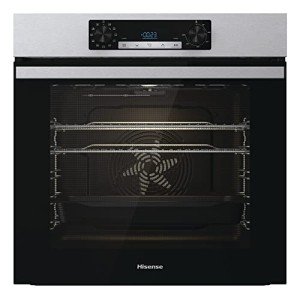Here's An Interesting Fact About Single Fan Oven
페이지 정보

본문
Understanding Single Fan Ovens: A Comprehensive Guide
Intro
As contemporary kitchens grow increasingly advanced, home appliances developed for efficiency and performance are at the forefront of consumer interest. One such appliance that stays popular among home cooks and baking lovers is the single fan oven, an electric design known for its flexibility and ease of usage. This post provides in-depth details about best single ovens Uk fan ovens, including their performance, advantages, types, and considerations for purchase.
What is a Single Fan Oven?
A single fan oven, likewise known as a convection oven, includes a single cooking chamber with a fan and exhaust system that distributes hot air uniformly throughout the cooking space. This leads to an even cooking temperature level and enhanced cooking performance compared to standard static ovens.
Secret Components of a Single Fan Oven
- Heating Elements: Usually located on top and bottom, these produce heat for cooking.
- Fan: The central feature that circulates the hot air within the oven, promoting quicker and more even cooking.
- Thermostat: Regulates the temperature to make sure optimum cooking conditions.
- Control board: Provides user interface alternatives for setting temperatures, cooking times, and modes.
How Does a Single Fan Oven Work?
Single fan ovens run by integrating the heat from the heating components with the air movement created by the fan. The hot air is dispersed uniformly around the food, considerably minimizing cooking time while likewise permitting lower cooking temperatures.
Benefits of Using a Single Fan Oven
- Faster Cooking Times: The flowing air permits food to cook faster compared to traditional ovens.
- Even Cooking: Food is exposed to constant heat from all sides, reducing the chances of uneven cooking or locations.
- Flexibility: These ovens can be used for baking, roasting, and even grilling, making them appropriate for a vast array of dishes.
- Energy Efficiency: By cooking at lower temperature levels and in less time, these ovens might use less energy than their traditional equivalents.
- Moisture Retention: The design helps retain wetness in dishes, resulting in juicy roasts and baked products with a light texture.
Kinds Of Single Fan Ovens
When thinking about a single fan oven, consumers might experience various types based upon features and design. Here are a couple of common types:
1. Built-in Single Fan Ovens
- Description: Integrated into kitchen cabinetry for a seamless look.
- Pros: Saves counter space, aesthetically pleasing.
- Cons: Higher installation costs, might need professional aid.
2. Freestanding Single Fan Ovens
- Description: Standalone units that can be positioned anywhere in the kitchen.
- Pros: Easy to install, versatile placement.
- Cons: Can take up more space, may not mix well with cabinetry.
3. Range Cookers with Fan Ovens
- Description: Multiple cooking alternatives, including a fan oven, integrated in one system.
- Pros: Offers different cooking techniques, perfect for enthusiastic cooks.
- Cons: Generally more pricey, larger footprint.
Comparison Table of Single Fan Oven Types
| Type | Pros | Cons |
|---|---|---|
| Built-in | Space-saving, visually pleasing | Higher costs, professional setup required |
| Freestanding | Flexible placement | Takes up more space, might not match cabinets |
| Range Cooker | Numerous cooking techniques | Higher price, bigger size |
Selecting the Right Single Fan Oven
When picking a single fan oven, several factors must be considered to make sure that it fulfills personal cooking requirements and fits within your kitchen design.
Factors to Consider
- Size and Capacity: The size must complement your kitchen layout while using sufficient capacity for your cooking practices.
- Features and Functions: Look for adjustable racks, self-cleaning choices, and several cooking modes to improve versatility.
- Energy Efficiency: Check for energy rankings; some designs are created to be particularly energy-efficient.
- Spending plan: Costs can vary substantially, making it vital to establish a sensible budget plan ahead of time.
Maintenance Tips for Single Fan Ovens
- Regular Cleaning: Wipe down interior surface areas after use to avoid residue accumulation.
- Inspect the Fan: Ensure the fan is devoid of blockages and working correctly.
- Check Seals: Regularly examine the door seals for wear and tear to keep cooking efficiency.
- Expert Servicing: Schedule routine expert checks to guarantee optimum operation.
FAQs about Single Fan Ovens
1. Can I use my single fan oven for baking?
Definitely! Single fan ovens are excellent for baking, supplying constant temperatures important for cakes, cookies, and breads.
2. Is it needed to preheat a single fan oven?
While preheating is generally advised for optimal results, due to the efficiency of a fan oven, some recipes may not need it.
3. Can I prepare multiple meals simultaneously?
Yes! The even heat distribution in single fan ovens permits you to bake or roast numerous dishes all at once, using all rack levels effectively.
4. Does a single fan oven cook much faster than a traditional oven?
Yes, the fan-assisted heating minimizes cooking times, making it possible for faster cooking.
Single fan ovens use a remarkable balance of speed, flexibility, and effectiveness, making them an important addition to any kitchen. Whether for baking, roasting, or everyday cooking, these ovens ensure that home cooks can produce scrumptious meals with ease. By understanding the benefits, types, and factors to consider for buying a single fan oven, customers can make an informed decision that lines up with their culinary desires and kitchen characteristics.
Welcoming the functionalities of a single fan oven undoubtedly leads the way for boosted cooking experiences in the contemporary kitchen.

- 이전글Unlocking the Power of Speed Kino with Bepick: Joining an Innovative Analysis Community 25.07.01
- 다음글Discovering Trustworthy Gambling Sites with Sureman: Your Scam Verification Platform 25.06.30
댓글목록
등록된 댓글이 없습니다.


